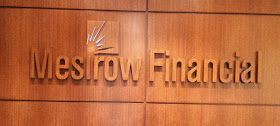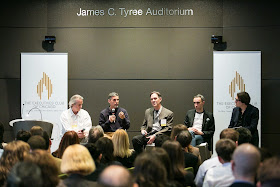RICHARD PRICE
BUD SEMPLE
CHUCK TEMPLETON
CRAIG SAMPSON AND SAM YAGAN
ROB WOLCOTT
NETWORKING
TIPS FROM THE TOP
Last week I had the privilege of
sitting on a panel with two extremely successful serial entrepreneurs (Sam
Yagan – founder of OkCupid and now CEO of Match.com and Chuck
Templeton – founder of Open Table and now MD of the ImpactEngine
accelerator at 1871) which was moderated by my good friend, Rob Wolcott, who
runs the Kellogg Innovation Network (KIN). The title of the panel was slightly
longer than the typical length of my blog posts (so I don’t want to repeat it
here) and no good entrepreneur stays on point anyway - so let’s just say that
it was an evening of quips and networking tips from a bunch of very smart and
experienced people. I learned and laughed a lot (and caught a few things
that were new ideas to me as well) and I thought I’d share a couple of the
highlights.
(1) Walk the Walk and Wear the T-Shirt
I’m usually the most under-dressed guy at grown-up events like this, but Sam Yagan
was wearing a Match.com t-shirt under his jacket so, from a sartorial
splendor standpoint, it was pretty much a draw. The more important point was
what Sam said about why he was wearing the shirt and what wearing the shirt
says about Sam. He said that, as the CEO, he’s always selling and promoting the
business and that it’s a critical part of that process that everyone he meets
knows that he’s all-in, fully-committed, and sincerely does believe that
Match.com will change your life for the better and, if you’ve got the time,
he’ll tell you how and why.
My friend
Slava Rubin who co-founded Indiegogo (and is now the CEO) always wears a
company t-shirt when he travels. He’s plenty proud of the business he’s built
too and it shows the minute you meet him and you’ll miss your plane for sure if
he gets started talking about the company and the latest and greatest crowd
funding successes that they’ve helped to make happen. He says, of course, that
his shirt’s a comfy way to roll, but the real reason is that he knows he’s
going to pass a bunch of people on the trip and it’s the cheapest form of
subliminal advertising he’s come up with so far which also saves him a bundle
on marketing.
It’s
all about authenticity, believing in your business and yourself and walking the
walk. Leaders lead by example or they don’t really lead at all. The day you’re
not comfortable in your role, in the business, or in the company t-shirt, is
the day you should find another place to be. If you’re not excited about what
you’re doing and proud of the place you doing it, do something else. This stuff
(building new businesses and changing the world) is just too hard and life’s
too short to go to work every day without a spring in your step and a smile on
your face. Not everything will ever be fun and easy, but as long as it matters
and you’re making a difference, there’s no better place to be.
(2) You Never Know Who’s Going to Bring
You Your Future
Rob Wolcott likes to say that at KIN he tries to never leave serendipity to
chance, but Chuck Templeton told the audience two different ways that – in the
early days of his business - he manufactured and mined his own serendipity. One
was a process and one was an attitude and they both helped him build his
earliest networks of supporters and sponsors and also – crucially – helped him
fill in the gaps in his knowledge and experience by reaching out to others for
help.
The
process was pretty simple. He’d read every issue of what - for a few minutes
back then - was more or less the hot tech industry magazine (The Industry
Standard) – which he described as an early version of WIRED
(although the fact is that WIRED was started about 5 years before it) and
when he read about people doing things that seemed interesting and relevant to
his business, he would reach out to them and ask them for a few minutes of
their time to answer his questions. Not only did he learn a lot about stuff,
but he said that he also learned a lot about how many people were so generous
with their time and how they would actually take the time to help a total
stranger. The morale of the story was pretty simple – it never hurts to ask –
and it can often turn into a real opportunity and it’s always an education.
The
attitude was also pretty straightforward. He said that you should always keep
an open mind when you meet people and that you should never underestimate them
because you really just never know who’s going to turn out to have the keys to
the kingdom. Or as I like to say: you never know who’s going to bring you your
future. Every encounter, every meeting, every conversation is a chance to learn
and also to build and extend your network. Everyone’s an example – some to emulate
and some to avoid like the plague – but you’ll never know which ones are which
if you don’t invest the time to explore the possibilities and have the right
attitude while you’re at it.
















